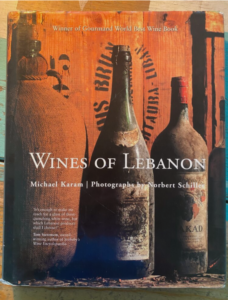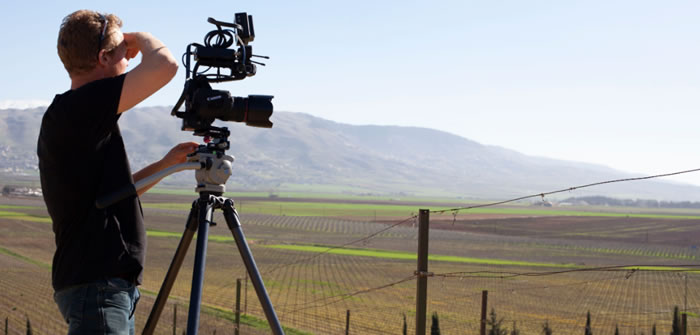Wine In 2013, inspired by the book Wines of Lebanon by Michael Karam, filmmakers Mark Johnston and Mark Ryan set out to change the perceptions of the Middle East – and in particular the tiny nation of Lebanon – by examining an enigmatic and misunderstood part of the world with winemakers who had a story to tell. The result is a very interesting documentary, Wine and war.
To learn more about Wine and war, we interviewed filmmakers Mark Johnston and Mark Ryan on camera:
Johnston and Ryan met in film school at USC in 1999. In 2014, they released their first award-winning documentary The Invisible Front, but by then, they were already in Lebanon recording stories of courage, adventure and determination. There, they met Michael Karam, and two became three.
The idea was to make a film that celebrated the resilience of the Lebanese entrepreneur through the prism of wine. It is a story starts in the 2nd BC, when the Phoenicians, the ancient Lebanese, with their awesome trading empire gave the gift of wine to the then known world. They were the first wine merchants! But the main reason they created such vast commercial network throughout the Mediterranean was that they, like the Lebanese over subsequent centuries, had to travel beyond their shores to seek prosperity due to constant instability at home. In doing so, the Lebanese became the masters of crisis management, a skill personified by Lebanon’s winemakers who for thousands of years have gone about their work in war, famine, occupation and the constant hum of political instability.
 Indeed, only last month, the Lebanese, who were already suffering from the double whammy of economic collapse and the Covid-19 pandemic, were dealt another cruel blow when 2,700 tons of fertilizer exploded at Beirut port ripping apart much of the capital, killing hundreds and wounding thousands. But still they strive to overcome.
Indeed, only last month, the Lebanese, who were already suffering from the double whammy of economic collapse and the Covid-19 pandemic, were dealt another cruel blow when 2,700 tons of fertilizer exploded at Beirut port ripping apart much of the capital, killing hundreds and wounding thousands. But still they strive to overcome.
And so, over seven years and ten visits to Lebanon, France, the US and the UK, the three interviewed 35 wine makers, four archeologists, seven wine critics, a novelist and a Trappist monk. They included, not only the legendary Serge Hochar of Chateau Musar whose determination to make and export his wines during the darkest days of the 1975-1990 civil war, put Lebanon on the world wine map, but also the late Michel de Bustros and his French winemaker Yves Morard, who endured the Israeli invasion of 1982 and the aerial dogfights above the vines.
The film also features Naji Boutros of Chateau Belle-Vue, who planted vines in the mountain town of Bhamdoun where 500 of its inhabitants were murdered in 1983; Ramzi Ghosn of Massaya who stayed with his vines during the 2006 summer war between Hezbollah and Israel and a host of other winery owners who live in the shadow of instability, most recently cast by the presence of ISIS and the Syrian civil war.
The three filmmakers also spoke to the wine critics Jancis Robinson MW and the late Michael Broadbent MW; New York sommelier Paul Greico and archeologists, Drs Helene Sader, Patrick McGovern and Laure Salloum. They even tracked down Eat Pray Love’s Elizabeth Gilbert, who had a special relationship with Lebanon and its wine.
With deep dives into archival history and thousands of hours of editing the team have accomplished for the first time a film about Lebanon, wine and conflict that has matured beautifully over seven years to tell a clear, yet complex story about one of the oldest winemaking regions on earth.

